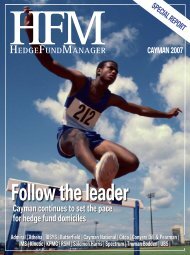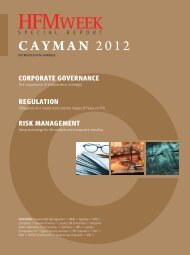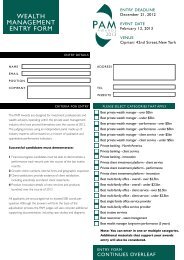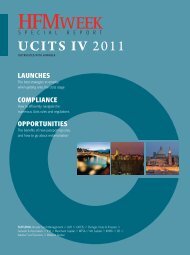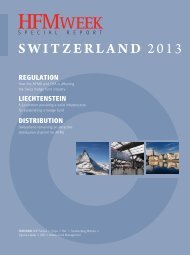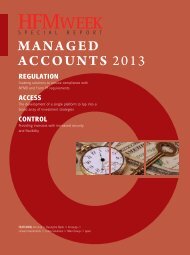US EAST COAST 2012 - HFMWeek
US EAST COAST 2012 - HFMWeek
US EAST COAST 2012 - HFMWeek
Create successful ePaper yourself
Turn your PDF publications into a flip-book with our unique Google optimized e-Paper software.
<strong>US</strong> <strong>EAST</strong> <strong>COAST</strong> <strong>2012</strong><br />
ACCOUNTANCY<br />
UK to visit clients and prospective clients throughout Europe.<br />
He is concerned that the visits could create a taxable<br />
nexus within the countries being visited. The tax partner<br />
explains that just like the <strong>US</strong>, the UK enters into many tax<br />
treaties with other foreign countries and just like the <strong>US</strong><br />
tax treaties, UK tax treaties generally include a permanent<br />
establishment clause that limits the imposition of income<br />
tax to those UK taxpayers that maintain an office or other<br />
habitual presence within the foreign country. Fortunately,<br />
the occasional visit does not generally constitute a habitual<br />
presence, but the tax partner advises the CFO to keep very<br />
accurate records to demonstrate visits to foreign countries<br />
by UK personnel are in fact just occasional.<br />
Does Kick have exposure to income tax in the UK<br />
The CFO knows that the investment management team<br />
is located within the NYC office and the members of the<br />
investment management team will likely join the UK personnel<br />
in visits to clients and prospective clients<br />
located in the UK. The tax partner informs the<br />
CFO that the same type of permanent establishment<br />
clause referred to above provides similar protection<br />
to Kick under the <strong>US</strong> Tax Treaty with the<br />
UK. However in this case, the tax partner carefully<br />
warns the CFO that because the office of Kick UK<br />
is located in London, the visits by the Kick investment<br />
management team to the UK office may simply<br />
become too frequent to be less than habitual.<br />
Does Kick have exposure to income tax in other<br />
European countries<br />
Again, Kick is saved by the permanent establishment<br />
clause. But this time, it is the permanent establishment<br />
clause contained in the <strong>US</strong> tax treaty<br />
with each of the foreign countries and not the UK<br />
tax treaty that provides the necessary relief from<br />
the imposition of income tax on Kick.<br />
DURING THE PAST<br />
DECADE, INVESTMENT<br />
MANAGERS HAVE FACED<br />
THE CHALLENGES OF A<br />
GLOBAL ECONOMY AND<br />
A DWINDLING <strong>US</strong> CLIENT<br />
BASE. EVOLUTION WAITS<br />
FOR NO ONE INCLUDING<br />
INVESTMENT MANAGERS<br />
”<br />
If the Kick financial statements are audited in accordance<br />
with <strong>US</strong> GAAP, does Kick have to worry about<br />
FIN 48<br />
The tax partner has been down this road many times before.<br />
He explains to the CFO that any uncertainty with<br />
respect to the possible imposition of a state income tax at<br />
the management company (partnership) level is subject to<br />
a FIN 48 Analysis.<br />
Thus, he warns the CFO that investment advisory<br />
services income from clients located in Illinois, New<br />
Hampshire and Washington will likely trigger income tax<br />
liability at the partnership level that cannot be explained<br />
through a more likely than not conclusion that Kick will<br />
receive the benefit of not having to pay an income tax in<br />
these states. However, it is possible that the amount of income<br />
tax could be immaterial to the financial statements.<br />
In the absence of immateriality, the audited financial statements<br />
must disclose an additional income tax liability for<br />
state income taxes.<br />
CONCL<strong>US</strong>ION<br />
Today’s investment managers compete in a global<br />
economy searching for investors in the four corners<br />
of the world. They have survived through<br />
the worst of economic times by exercising initiative<br />
and ingenuity. They are survivors and they are<br />
a financial resource. The taxing authorities, both<br />
foreign and domestic, are looking for them every<br />
day hoping to share in their success by imposing<br />
taxes in new and more aggressive ways.<br />
In planning for expansion, investment managers<br />
must exercise that same initiative and ingenuity<br />
to avoid paying more than their fair share of taxes.<br />
They must recognise the myriad tax issues that<br />
come with expansion and they must obtain the<br />
right professional advice to accomplish their tax<br />
objectives. n<br />
16 HFMWEEK.COM



